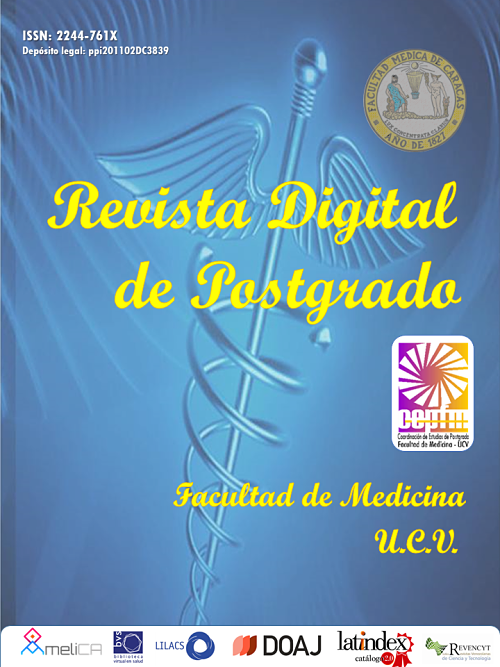Reflective analysis of the teaching-learning process in surgical specialties: competency-based education approach
DOI:
https://doi.org/10.37910/RDP.2025.14.1.e418Keywords:
Competency-Based Education, Medical Education, Postgraduate Medical Education, Surgical TrainingAbstract
This study addresses the teaching-learning process in surgical specialties from the perspective of Competency-Based Education (CBE), highlighting the need to transform traditional models, such as Halsted's tutelary model, into adaptive approaches aligned with the contemporary demands of the health system. A
qualitative, descriptive and reflexive methodology was used, based on an exhaustive documentary analysis. This approach allowed to evaluate the strengths,
opportunities, weaknesses and threats in surgical training, with data collected in academic databases and publications between 2013 and the present. The results highlighted the integration of innovative methodologies such as high-fidelity simulators and virtual reality, essential to strengthen clinical practice and guarantee patient safety. Weaknesses were also identified, such as the lack of uniformity in evaluation methods and resistance to change in academic institutions, as well as threats associated with budgetary restrictions and regulatory policies. The discussion highlights the importance of a strategic analysis to contextualize surgical programs in local and regional realities, adapting international standards. CBE proves to be a comprehensive framework that combines technical, cognitive, and ethical skills with humanistic values. In conclusion, this work highlights the need for profound reforms in pedagogical and organizational models, supported by strategic analysis tools, to ensure adaptive, safe, and ethical surgical training, aligned with the needs of current and future health systems.
Downloads
References
Patiño MJ, Moros CA. Perspectiva de la Educación Médica de Postgrado de Medicina Interna en Venezuela. Revista Medicina Interna. 2006; 22(2): 110-131.
González P, Medina N, Moreno ID. Escala del ambiente de enseñanza-aprendizaje de especialistas médicoquirúrgicos en formación. Educ Méd Sup. 2022; 36 (2).
Rodríguez Z, Rizo R, Mirabal A, Nazario AM, García ME. Educación en el trabajo en la enseñanza médica superior. Medisan. 2017; 21(7):913-925.
Porras JD. Enseñanza y Aprendizaje de la Cirugía. Inv Ed Med. 2016; 5(20):261-267.
Frank JR, Mungroo R, Ahmad Y, Wang M, De Rossi S, Horsley T. Toward a definition of competency-based education in medicine: a systematic review of published definitions. Med Teach. 2010; 32(8):631-637.
Royal Australasian College of Surgeons. Surgical Competence and Performance. Melbourne: Royal Australasian College of Surgeons. 2011.
Retana JAG. Modelo educativo basado en competencias: importancia y necesidad. Rev. Electrónica Actual. Investig. En Educ. 2011; 11(3): 1-24.
Téllez A, González L. Educación Médica Basada en Competencias. 2020. 10.13140/RG.2.2.19481.36969.
Tobón S. La formación basada en competencias en la educación superior: el enfoque complejo. México: Universidad Autónoma de Guadalajara. 2008.
Mezzadri JJ, Campero A, Tauro N. La educación de postgrado actual en la neurocirugía de Argentina.
Estrategias para su mejoramiento a partir de un análisis FODA. Rev Argent Neuroc. 2023; 37: 01.
Peters MDJ, Godfrey CM, Mcinerney P, Soares CB, Khalil H, Parker D. (2015). Methodology for JBI Scoping Reviews. Joanna Briggs Institute. 53(9):0-24.
Thomas A, Lubarsky S, Durning SJ, Young ME. Knowledge syntheses in medical education: demystifying scoping reviews. Acad Med. 2017; 92(2):161-166.
Fleites R, Perdomo L, González L. Competencias en cirugía: su inminente evolución en la formación médica. Educentro, 2022; 14. Epub.
Mantilla GC, Ariza K, Santamaria A, Moreno S. Educación médica basada en competencias: revisión de enfoque. Univ Med. 2021; 62(2).
Kotsis SV, Chung KC. Application of See One, Do One, Teach One Concept in Surgical Training. Plast Reconstr Surg. 2013; 131(5): 1194–1201.
Morán J, Ruiz P. ¿Reinventar la formación de médicos especialistas?: Principios y retos. Nefrología (Madrid), 2010; 30(6): 604-612.
Mezzadri JJ. (2019). Educar en cirugía de columna II: Evolución en la neurocirugía nacional frente al cambio permanente y su relación con la certificación. Rev Argent Neuroc. 2019; 33(3): 160-165
Cameron JL. William Stewart Halsted. Our surgical heritage. Ann Surg. 1997; 225: 445–458.
Morales JD, Varela M. El debate en torno al concepto de competencias. Invest en Educ Med. 2015. En: https://www.sciencedirect.com/science/article/pii/S2007505715721678
McClelland D. Testing for Competence rather than for Intelligence. Am Psychol. 1973; 28(1):1-14.
Bunk GP. Teaching Competente in Initial and Continuing Vocational Training in the Federal Republic of Germany. Vocat Train Eur J. 1994; 1:8-14.
Gual A, Oriol-Bosch A, Pardell H. El médico del futuro. Med Clin (Barc). 2010; 134: 363-8.
Raeburn A. Análisis FODA: qué es y cómo usarlo (con ejemplos). 2023. Disponible enasana.com/es/resources/swat.analysis.
Betancourt DF. Cómo hacer el análisis FODA (matriz FADO) paso a paso + ejemplo práctico. Ingenio Empresa. 2018: www.ingenioempresa.com/matriz-foda.
Downloads
Published
How to Cite
Issue
Section
License
Copyright (c) 2025 Manuel Da Silva

This work is licensed under a Creative Commons Attribution 4.0 International License.
Usted es libre de:
- Compartir — copiar y redistribuir el material en cualquier medio o formato
- Adaptar — remezclar, transformar y construir a partir del material
- para cualquier propósito, incluso comercialmente.
Bajo los siguientes términos:
-
Atribución — Usted debe dar crédito de manera adecuada, brindar un enlace a la licencia, e indicar si se han realizado cambios. Puede hacerlo en cualquier forma razonable, pero no de forma tal que sugiera que usted o su uso tienen el apoyo de la licenciante.
- No hay restricciones adicionales — No puede aplicar términos legales ni medidas tecnológicas que restrinjan legalmente a otras a hacer cualquier uso permitido por la licencia.



